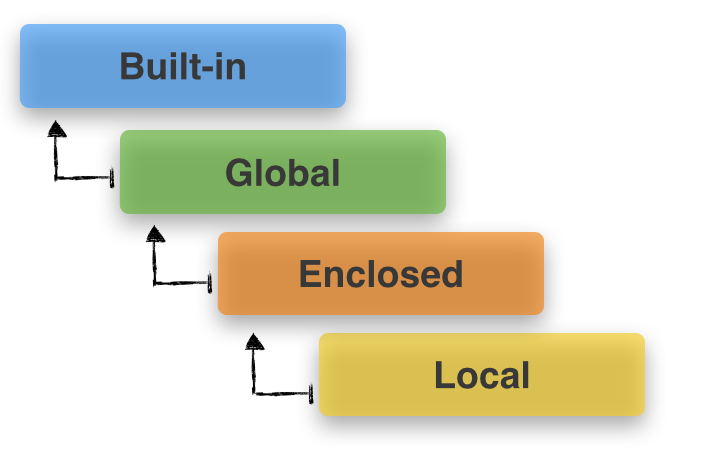Scope
Scope refers to the visibility of variables. To be more clear, what parts of your program see which variables. In Python, we use the LEGB Rule:

Local:
- Defined in the local scope of functions
def sales_tax(amount):
rate = 0.0625 # Local variable
tax_total = amount * rate # rate can be seen here
total = tax_total + amount
print(total)
# Call function and pass parameter
sales_tax(200) # Rate cannot be seen here
Enclosing-Function Global
- Refers to variables defined within local scope of functions wrapping other functions
def program():
amount = 200 # Enclosing-Function Global variable
def sales_tax():
rate = 0.0625
tax_total = amount * rate # Amount can be seen here
total = tax_total + amount
print(total)
sales_tax() # Amount could be seen here
# Amount could not be seen here
program()
Global/Module
- Variables defined at the top level of files and modules
amount = 200 #Global variable, can be seen everywhere below.
def sales_tax():
rate = 0.0625
tax_total = amount * rate
total = tax_total + amount
print(total)
# Did not pass parameters
sales_tax()
Built-In
- Loaded into scope when interpreter starts up. (Ex: hash(), min(), dict(), print(), etc)
Modifying Global Variables Within a Different Scope
- We can use the global keyword to grant access to global variables within a different scope, allowing for modification.
Example:
a = 1
# Uses global because there is no local 'a'
def f():
print('Inside f() : ', a)
# Uses local variable a
def g():
a = 2
print('Inside g() : ', a)
# Uses global keyword to grant access to global a, allowing modification
def h():
global a
a = 3
print('Inside h() : ',a)
# Global scope
print('global : ', a)
f()
print('global : ', a)
g()
print('global : ', a)
h()
print('global : ', a)
Output:
global : 1
Inside f() : 1
global : 1
Inside g() : 2
global : 1
Inside h() : 3
global : 3